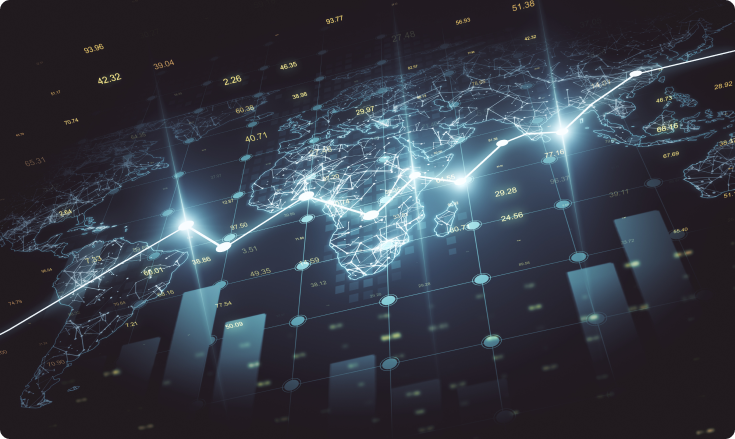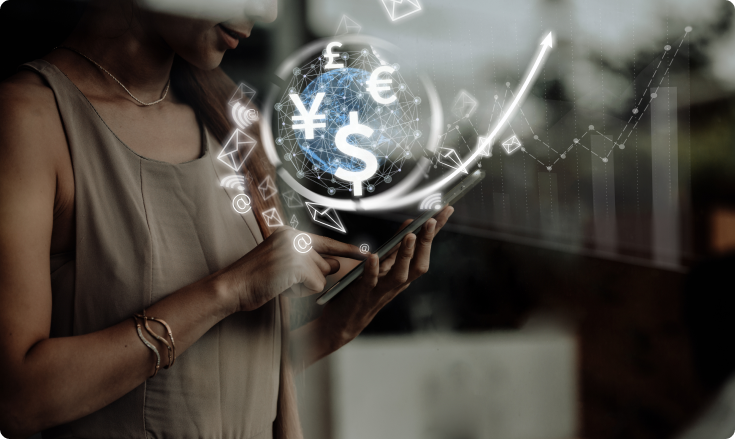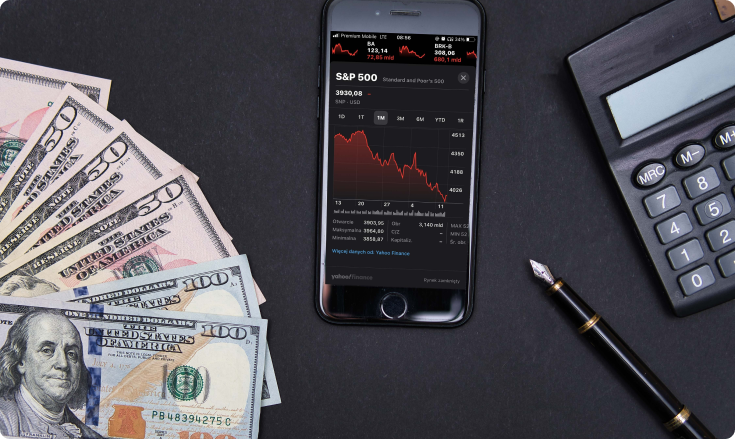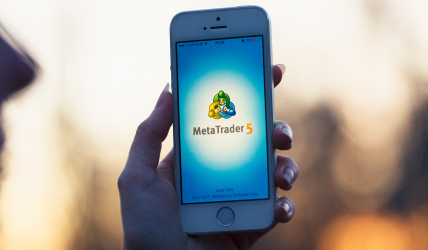What Is The Foreign Exchange Market?

Foreign exchange or simply forex or FX is the process of changing one currency into another, with many daily operations that require us to do so.
Here, we will talk about the foreign exchange as a way of making money - what it is and how it works.
People from all around the world are trading on this market, regardless of the country, they're living in or the official currency in that country, which makes the foreign exchange market the world’s biggest financial market, with approximately $5.1 trillion of daily turnovers.
The foreign exchange market is a global online marketplace where currencies are traded.
It is a network of buyers and sellers who trade the currency among themselves at an agreed price. In this market, currencies of all nations can be exchanged against one another via a specific platform and with the help of a broker. It is important to understand that in this trade, currencies are traded as pairs. The forex market is open 24 hours a day, five days a week (including most holidays), and sees a huge amount of trading volume.

What are currency pairs?
A currency pair is the quotation of two different currencies, with the value of one currency being quoted against the other. The first listed currency of a currency pair is called the base currency, and the second currency is called the quote currency. Currency pairs compare the value of one currency to another—the base currency (or the first one) versus the second or the quote currency.
Currency pair indicates how much of the quoted currency is needed to purchase one unit of the base currency. All currencies are identified by an ISO currency code, or the three-letter alphabetic code they are associated with on the international market. So, for the U.S. dollar, the ISO code would be USD.
The currency pair itself can be thought of as a single unit—an instrument that is bought or sold. When you buy a currency pair from a forex broker, you buy the base currency and sell the quote currency. Reciprocally, when you sell the currency pair, you sell the base currency and receive the quote currency. The currency pair can be a reflection of the strength of one economy versus another, and the exchange rate is a function of the relationship of the two economies.
You should try to understand and consider the various technical, political, and economic events that have the greatest effect on each currency. The main objective of trading CFD currency pairs is to exchange one currency for another currency given the expectation that the currency pair will appreciate/depreciate depending on the position that is being taken by the trader. There are many major currency pairs within the forex market around the world. Beside EUR/USD, most common currency pairs are also:
- USD/JPY. This currency pair sets the US dollar against the Japanese Yen.
- USD/GBP. This currency pair sets the US dollar against the United Kingdom pound and is commonly referred to as the pound-dollar.
- USD/CHF. This currency pair sets the US dollar against the Switzerland currency. It is referred to as the dollar swissy.
- USD/CAD. This currency pair sets the US dollar against the Canadian dollar. It is referred to as the dollar-loonie.
- AUD/USD. This currency pair sets the US dollar against the Australian dollar and is referred to as the Aussie dollar.
- NZD/USD. This currency pair sets the currency of New Zealand against the US dollar, and it is referred to as the kiwi dollar.
Participants in the Forex market
The foreign exchange market structure constitutes various participants, and a few of them are:
- Commercial and investment banks. The greatest volume of currency is traded in the interbank market. This is where banks of all sizes trade currency with each other and through electronic networks. Big banks account for a large percentage of total currency volume trades. Banks facilitate forex transactions for clients and conduct speculative trades from their own trading desks.
When banks act as dealers for clients, the bid-ask spread represents the bank's profits. Speculative currency trades are executed to profit on currency fluctuations. Currencies can also provide diversification to a portfolio mix.
- Central banks. Central banks, which represent their nation's government, are extremely important players in the forex market. Interest rate policies and the open market operations of central banks influence currency rates to a very large extent.
A central bank is responsible for fixing the price of its native currency on forex. This is the exchange rate regime by which its currency will trade in the open market. Exchange rate regimes are divided into floating, fixed and pegged types.
Any action taken by a central bank in the forex market is done to stabilize or increase the competitiveness of that nation's economy. Central banks (as well as speculators) may engage in currency interventions to make their currencies appreciate or depreciate. For example, a central bank may weaken its own currency by creating additional supply during periods of long deflationary trends, which is then used to purchase foreign currency. This effectively weakens the domestic currency, making exports more competitive in the global market. Central banks use these strategies to calm inflation. Their doing so also serves as a long-term indicator for forex traders.
- Investment managers and hedge funds. Portfolio managers, and hedge funds make up the second-biggest collection of players in the forex market next to banks and central banks. Investment managers trade currencies for large accounts such as pension funds and foundations. An investment manager with an international portfolio, will have to purchase and sell currencies to trade foreign securities. Investment managers may also make speculative forex trades, while some hedge funds execute speculative currency trades as part of their investment strategies.
- Multinational corporations. Firms engaged in importing and exporting conduct forex transactions to pay for goods and services. Consider the example of an Austrian solar panel producer that imports American components and sells its finished products in China. After the final sale is made, the Chinese yuan the producer received must be converted back to euros. The Austrian firm must then exchange euros for dollars to purchase more American components. Companies trade forex to hedge the risk associated with foreign currency translations. The same Austrian firm might purchase American dollars in the spot market, or enter into a currency swap agreement to obtain dollars in advance of purchasing components from the American company in order to reduce foreign currency exposure risk. Additionally, hedging against currency risk can add a level of safety to offshore investments.
- Individual investors. The volume of forex trades made by retail investors is significantly low compared to financial institutions and companies. However, it is growing rapidly in popularity. Retail investors base currency trades on a combination of fundamentals (i.e., interest rate parity, inflation rates, and monetary policy expectations) and technical factors (i.e., support, resistance, technical indicators, price patterns).
Structure
The foreign exchange market is divided into two categories - the spot market and the derivatives market.
The spot market is a market where a financial instrument (eg. a currency) is traded for immediate delivery. Spot markets are also known as cash markets. A derivatives or a futures market offers forwards, futures, options and currency swaps. These were popular before the development of the spot market. A futures market is a derivative of the spot market and in a simple sense, a futures market is the reflection of the spot market in the near future. Futures prices are guided by movements in spot prices, i.e. what would be the likely spot price in a future time period.
How to trade forex?
Currency trading was very difficult for individual investors prior to the internet. Because forex trading requires a lot of capital, some time ago most traders were large multinational corporations, hedge funds or high-net-worth individuals. With help from the internet, today, this market is accessible to everyone. Most online brokers offer very good leverage to individual traders who can control a large trade with a small account balance.
To start trading the foreign exchange market, you will need a platform, and the platform is provided by a brokerage house. The brokerage house is then connected to the local bank. As we can see, this is a very simple chain, consisting of only two parties and yourself.
When investors enter an exchange platform, let’s say one of the most popular, such as MetaTrader 5, they will see the list of pairs that they can trade with. Once a pair is chosen, the trade can begin. Considering factors such as the trend that a pair has had recently, analytic forecasts and news, bulletins, geopolitical situation, etc., an investor analyzes the future behavior of it, and chooses whether to buy this pair or sell it.
Conclusion
The foreign exchange market is the market where you can trade with all world currencies online. Currency exchange is important to all of us in order to conduct foreign trade, international business, or tourism.
It’s very easy to open an account and start trading. With a licensed and supportive brokerage house, your capital will be safe, you will have many trading options and advantages, as well as an opportunity to withdraw money at any time.
Sources Consulted:
1. Bradfield, D. The history of forex. https://www.dailyfx.com/education/beginner/history-of-forex.html
2. Morratt, B. Forex trading history - how Forex trading started. https://www.expertinvestor.net/forex/guides/history/ (2020)
3. Smith, T. Spot Market. https://www.investopedia.com/terms/s/spotmarket.asp (2020)
4. Snow, R. What is Forex? Forex Trading Explained. https://www.dailyfx.com/education/beginner/what-is-forex.html
5. What is forex and how does it work? https://www.ig.com/en/forex/what-is-forex-and-how-does-it-work
6. Chen, J. Learn About Trading FX with This Beginner’s Guide to Forex Trading. https://www.investopedia.com/articles/forex/11/why-trade-forex.asp (2021)
7. Lioudis, N. What Is Foreign Exchange? https://www.investopedia.com/ask/answers/08/what-is-foreign-exchange.asp (2020)
8. Vaidyia, D. Foreign exchange market. https://www.wallstreetmojo.com/foreign-exchange-market/
9. Chen, J. Currency pair. https://www.investopedia.com/terms/c/currencypair.asp
10. Segal, T. Who trades forex and why. https://www.investopedia.com/articles/forex/11/who-trades-forex-and-why.asp
11. Jagran, K. Understanding the difference between spot futures markets. https://krishijagran.com/agripedia/understanding-the-difference-between-spot-futures-markets/
LimitPrime © 2026
Begin to invest and
start earning today!
Categories
Do you need personalized assistance?
READ MORE INTERESTING ARTICLES

Diversificationnoun the action of diversifying something or the fact of becoming more diverse. a trading strategy that reduces risk. D...
Read More
As any risk disclosure will tell you, trading financial instruments put the trader at risk of losing some or all of their allocated cap...
Read More
What are indices?Indices measure the performance of a group of stocks, bonds or other investments. These investments are often grouped...
Read More